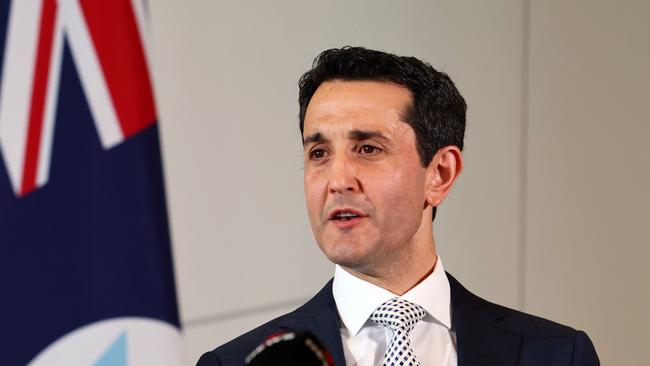Economist urges David Crisafulli to overhaul Queensland’s blown-out infrastructure pipeline
Premier David Crisafulli must immediately ‘reassess’ Queensland’s $130bn infrastructure pipeline to find budget savings, a leading economist says.

Premier David Crisafulli must immediately “reassess” Queensland’s $130bn infrastructure pipeline to find budget savings after Treasury’s mid-year fiscal review revealed the state was facing record-breaking deficits and exploding public debt, a leading economist says.
Queensland’s four-year “Big Build” has suffered a $22.6bn cost blowout in just six months, helping to push total government debt to $217.83bn by mid-2028.
With Treasurer David Janetzki this week warning that the coal-rich state was now facing a “highly likely” credit downgrade from its existing AA+ rating, Tulipwood Economics director Joe Branigan said escalating construction costs had made some projects unviable.
“Quite clearly, the state’s capital program must be reassessed on a case-by-case basis to ensure Queenslanders still benefit from these multibillion-dollar investments,” said Mr Branigan, a public policy economist who worked for the federal Treasury and Productivity Commission.
“As project costs rise, benefit-cost ratios decline and can even turn negative for many marginal projects and harebrained thought bubbles that were significantly undercooked in the first place.
“This is why regular gateway reviews that properly assess both expected costs and expected benefits is critical for prudent public financial management.”

The state government in November suspended the so-called CFMEU tax on large state-funded construction projects, which Mr Janetzki has said would save $17bn over five years.
Best Practice Industry Conditions, introduced by the former Labor government, force contractors tendering for major government-funded projects to negotiate agreements with unions and sets conditions on worksites.
Draft laws are also before state parliament to reinstate the productivity commission, which will be tasked with a fresh review of the building industry.
Queensland’s infrastructure spend per capita was expected to overtake that of NSW and Victoria this financial year, with housing, Olympics, energy, transport and hospital building projects all competing for workers.
Describing the 83 per cent deterioration in the fiscal deficit over the forward estimates as “truly stunning”, Mr Branigan said now was the time for “serious” budget repair
“Queensland’s fiscal deficit has exceeded 3.5 per cent of gross state product and could be 4 per cent by the end of this decade without serious ground-up structural budget reform, which puts us in Pacific Island territory, on par with PNG and Fiji,” he said.
“Since 1996-97, Australia’s fiscal deficit has only ever exceeded 3.5 per cent of gross domestic product on four occasions, in the two years following the global financial crisis and the two years following the Covid pandemic.
“I’m not sure what Queensland’s excuse is.”
Asked whether he would be willing to cut projects promised by the former Labor government, Mr Janetzki said the reinstated productivity commission would be investigating ways to improve the state’s building industry.
“We need to make sure that our building construction industry is delivering the projects we need, not just to meet housing targets, but to be delivering the Olympics that Queenslanders so richly deserve,” he said.






To join the conversation, please log in. Don't have an account? Register
Join the conversation, you are commenting as Logout